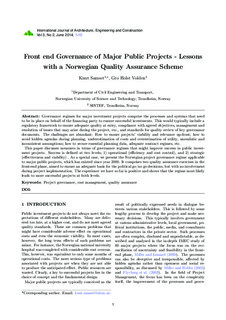Front end Governance of Major Public Projects - Lessons with a Norwegian Quality Assurance Scheme
Journal article
Published version
Permanent lenke
http://hdl.handle.net/11250/2466422Utgivelsesdato
2014Metadata
Vis full innførselSamlinger
Originalversjon
10.7492/IJAEC.2014.009Sammendrag
Governance regimes for major investment projects comprise the processes and systems that need to be in place on behalf of the financing party to ensure successful investments. This would typically include a regulatory framework to ensure adequate quality at entry, compliance with agreed objectives, management and resolution of issues that may arise during the project, etc., and standards for quality review of key governance documents. The challenges are abundant: How to ensure projects’ viability and relevance up-front; how to avoid hidden agendas during planning, underestimation of costs and overestimation of utility, unrealistic and inconsistent assumptions; how to secure essential planning data, adequate contract regimes, etc.
This paper discusses measures in terms of governance regimes that might improve success in public investment projects. Success is defined at two levels; 1) operational (efficiency and cost control), and 2) strategic (effectiveness and viability) . As a special case, we present the Norwegian project governance regime applicable to major public projects, which has existed since year 2000. It comprises two quality assurance exercises in the front-end phase, aimed to ensure an adequate basis for the political go/no go decisions, but with no involvement during project implementation. The experience we have so far is positive and shows that the regime most likely leads to more successful projects at both levels.
